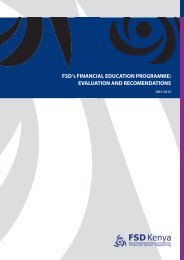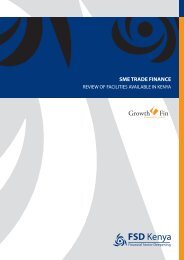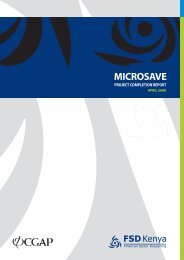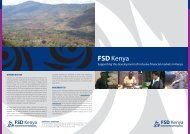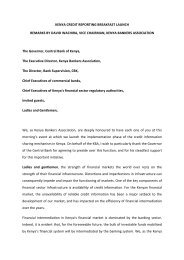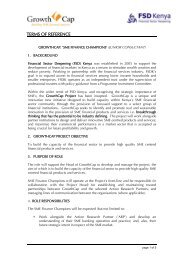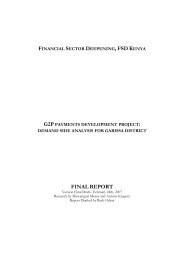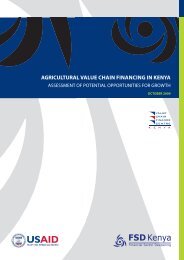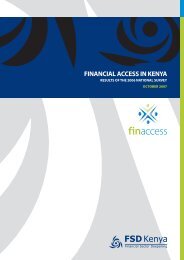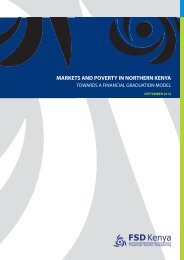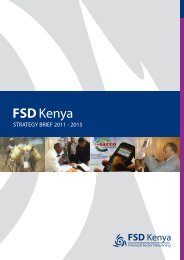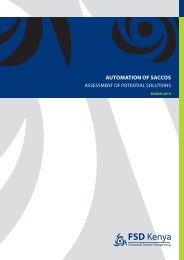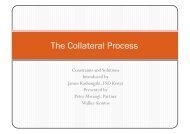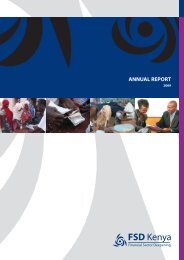Consumer protection diagnostic study - FSD Kenya
Consumer protection diagnostic study - FSD Kenya
Consumer protection diagnostic study - FSD Kenya
Create successful ePaper yourself
Turn your PDF publications into a flip-book with our unique Google optimized e-Paper software.
18 • CONSUMER PROTECTION DIAGNOSTIC STUDY: KENYA<br />
consideration of all legal implications and amendment of the regulation,<br />
which permits sharing of information from CBK-supervised institutions only<br />
among those institutions. Another potential concern is conflicts of interest that<br />
could arise in such an arrangement. Further, there might be certain compliance<br />
issues or anti-competitive behaviour where the interests of credit bureaus and<br />
banks (i.e., the clients of credit bureaus) are aligned with one another but not<br />
with those of consumers. Such an expansion might be more appropriate to<br />
consider once the system of information sharing among the banks is fully<br />
operational and robust data <strong>protection</strong>s have been put in place for borrowers<br />
from non-bank institutions.<br />
The regulation assigns CBK ownership of the data and mandates it to supervise<br />
the information sharing mechanism in the banking sector. It will need to<br />
monitor the self-regulatory activities of KCPA, given the uneven history of selfregulatory<br />
organisations. If the new arrangement proves not fully effective or<br />
unsustainable over time the authorities would need to take appropriate action.<br />
The proposed industry code of conduct covers consumer interests under<br />
section 4 (‘Duties to Customers’). These provisions should be benchmarked<br />
and revised (if necessary) against global best practices and lessons emerging<br />
from regulatory oversight of the credit industry’s implementation of consumer<br />
<strong>protection</strong> practices in <strong>Kenya</strong>.<br />
Deposit <strong>protection</strong> is one of the most basic forms of consumer <strong>protection</strong> in<br />
the banking industry. The limits on deposit insurance appear low at Kshs<br />
100,000 (US$1,350) and may require upward revision. In addition, depositors<br />
do not appear to have a more privileged claim than other unsecured creditors<br />
in bank liquidation.<br />
6.3.3 Recourse<br />
There are no specific regulations that set standards for or govern internal<br />
dispute resolution mechanisms for banks. Many banks have customer care<br />
desks in branches, report that they have dispute resolution mechanisms and<br />
can cite cases of managers attending to consumer complaints. Some banks<br />
have invested in call centres. However, actual practice in this area could not<br />
be confirmed during the <strong>diagnostic</strong>. In general consumers must navigate<br />
a patchwork of ad hoc internal dispute resolution procedures and external<br />
recourse mechanisms to resolve complaints and disputes with banks.<br />
The CBK reports that it expects banks to have a dispute resolution mechanism.<br />
Examiners review the complaint log, which also includes an explanation of the<br />
problem and how it was handled. The CBK also responds to consumers that<br />
call with complaints on their own initiative. The off-site examiners handle<br />
these cases on an ad hoc basis and rely on moral suasion to encourage banks<br />
to resolve issues.<br />
The KBA reports that it has a recourse mechanism for consumers that cannot<br />
resolve their issues with their bank, although it did not provide specific<br />
information on the number of cases it considers. The fact that the KBA<br />
committee is comprised of bank CEOs suggests that this recourse mechanism<br />
is only convened for significant cases.<br />
The scope of the <strong>diagnostic</strong> did not include an assessment of the effectiveness<br />
of any of the aforementioned internal dispute resolution or external third-party<br />
recourse mechanisms. However, the lack of regulation and oversight of these<br />
functions is sufficient grounds for further reflection on current practice.<br />
Focus group respondent<br />
“There are times you might check your balance only to realize that they have<br />
made some deductions. When you inquire about it, they tell you to come<br />
back the following week. They might return the money and sometimes<br />
they might say they have no idea what happened to the missing money.”<br />
Woman from Naivasha<br />
In the <strong>FSD</strong>/CGAP 2010 survey, 91% of respondents reported they were able to<br />
get satisfactory answers to queries made about their savings account at their<br />
bank. When asked if they contacted someone with concerns about the amount<br />
of payments or length of their loan, 8% responded that they called but were<br />
not able to get someone to speak with them (see boxed quote) and 8% said<br />
that they did not even try to call. However, FGD respondents were more vocal<br />
in their frustrations with having to inquire about problems with their accounts<br />
than the survey findings report.<br />
Perhaps more importantly, the overall findings of the surveys suggest that<br />
consumers have low expectations of how banks will treat them – and also<br />
weigh carefully the amounts in dispute against the likely costs of following<br />
up. The findings point to the need to better understand whether consumers<br />
even believe they have a right to dispute resolution, whether they know how<br />
to exercise that right, and whether they expect the process to be effective, all<br />
of which affect their trust in the overall system.<br />
A comparison with the incidence of complaints in other sectors might also<br />
suggest that the low number of complaints in the banking sector could be<br />
due to dysfunction in the internal dispute resolution and third-party recourse<br />
mechanisms. For example, the IRA has an explicit mandate to operate a<br />
recourse mechanism and reports that it handles about 3,000 cases per year.<br />
The Cooperative Tribunal handled 568 cases in 2006, in addition to a flow of<br />
about 15 complaints a month that are escalated above the level of the District<br />
and Provincial Cooperative officers to the federal Ministry of Cooperatives,<br />
Development and Marketing (MOCDM). The M-PESA customer care hotline<br />
handles at least 17,000 queries per day. The insurance and SACCO sectors have<br />
far fewer consumers than the banks, and yet the CBK only handles around 40-50<br />
cases per year. M-PESA has the most organized and accessible system and the<br />
volume of queries it handles suggests that the incidence of consumer disputes<br />
in the banking sector might well be significantly underrepresented in available



